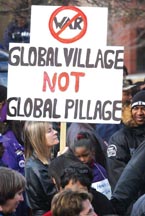The UMB Anti-War Committee presented an anti-war teach-in on Wednesday, March 9, at the Campus Center Ballroom. Three UMB professors and two student activists provided the audience with information about the war, its background, and the economic and social impact that it has on everyday American life.
The event was held by the student organization to promote the anti-war movement as a whole, as well as to alert UMass Boston students of the upcoming Global Day of Protest to End the Occupation of Iraq. The Boston component of that protest took place this past weekend on Boston Common.
Professor Jim Green of the College of Public and Community Service (CPCS) opened the teach-in, offering historical parallels between past wars and the current conflict in Iraq. He noted that the Mexican-American War of 1846, the Spanish-American War of 1898, and the conflict in the Philippines were imperialist wars fought to build an empire.
Green further said that, in his view, the imperialistic, oil-based nature of the war in Iraq places it in the same category as these past conflicts.
UMB Political Science Professor Primo Vannicelli was also among the speakers at the event. Vannicelli discussed historical factors that led to the Iraq war.
He noted that while mistakes were made in past U.S. foreign policy, “a generous impulse” guided that policy until the Cold War replaced that impulse with anti-Communist paranoia, and subsequently an abiding interest in the demands of global economic interests.
Under the influence of these forces America has “fought against social change in the world,” said Vannicelli.
Special Projects Coordinator for the William Joyner Center for the Study of War and Social Consequences, Paul Comacho, also offered his take on the factors of influence on the war in Iraq.
Camacho said that the war is a result of a confluence several forces, among them: privatization of the military, the neo-conservative intellectual movement, and the Christian right.
He also mentioned the shrinking influence of “good” Republicans who adhere to traditional conservative values, and the dangers posed by the government’s use of private military corporations in the Iraq war.
Camacho ended his talk by challenging students to join together to expose the criminal actions of the corporations and individuals who profit from the Iraq War.
Student Heather Turner spoke about the “war at home” in which she gave her take on the war’s economic impact on the lives of American citizens.
She offered rising tuition and fees and the work situation she says some adjunct professors refer to as “academic sharecropping” and examples of “beatings we’re taking both on and off campus.”Nathan Aldrich, a member of Military Families Speak as well as the UMB chapter of Socialist Alternative, presented his listeners with the message that one can support the troops in Iraq and still not support the war.
Aldrich’s talk touched on the politics behind the war. He cited both Democrats and Republicans as pro-war proponents of “dollar democracy,” continuing that in order to succeed, “the anti-war movement has to be an independent movement.” Aldrich then called upon the audience to send a “simple, clear message to the powers that be to get the troops out now!”Following the speakers, the audience asked questions and shared their opinions and concerns.
Kevin Scott, a Political Science student offered a conservative perspective. “Conservatives have a long-standing history of opposing overseas wars unless there is an imminent threat to America’s safety,” he said.
“Funding a pre-emptive war through deficit spending is against the doctrine of conservatism that I and many other conservatives believe in,” Scott continued.
A range of perspectives were expressed, however a majority of the crowd appeared to hold views that were reinforced by the event’s speakers.
“I learned a lot about the reasons behind the war. It was very educational,” said student, Pamela Monte.Stephen Huenneke, a third year UMB student agreed. “All the speakers gave very strong points that organization is the key to advancing the goals of the progressive anti-war movement,” he said.





















































